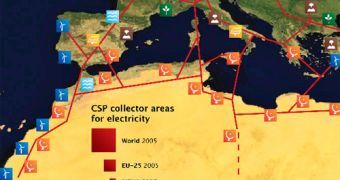The initial Desertec plan to obtain energy out of solar plants in North Africa, and transport it to Europe through a cable system installed under the Mediterranean Sea, might not function.
The project started up in 2009, with a budget of 400bn Euro (509.62bn $) with the hope to produce 125 gigawatts of electric power by 2050.
But things didn't turn out exactly as they were predicted. At the beginning of 2012, two reliable partners abandoned the project, Siemens and Bosch. Two other big industrial supporters were soon to follow them, Spiegel Online reports.
By then, the situation became fairly concerning.
“Siemens and Bosch are very big companies,” declared Dr. Daniel Ayuk Mbi Egbe, expert on African solar resources. “If they don't want to support this initiative it is going to be difficult for Desertec,” he added.
The most recent fail of Desertec was registered only few weeks ago, when the Spanish government has refused to undertake a solar power plants building project in Morocco, claiming that Spain's current situation does not allow such actions.
However, Desertec officials assure the project is in no danger. They say there are but small problems that are soon to be overcome.
Contrary to these assertions, Prof. Peter Droege, leader of the European association for renewable energy, Eurosolar, believes that there is a too strong reliance on external economic resources, which turns Desertec into a nonviable project and that its failure is obvious.
“I think it is struggling to find a reason to continue - It is clear it's lost it's original purpose, it is looking for a new direction,” Prof. Droege declared.
Beyond the controversial statements, Desertec could however get a real chance to be taken to a positive end. China has lately manifested its interest in the project.
“China's money could help, China wants the know how. Yes perhaps China could save the project, they are very potent,” said Hans-Josef Fell, a Green Party MP in the German parliament.

 14 DAY TRIAL //
14 DAY TRIAL //